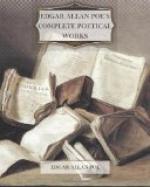It appears evident, then, that there is a distinct limit, as regards length, to all works of literary art—the limit of a single sitting—and that, although in certain classes of prose composition, such as Robinson Crusoe (demanding no unity), this limit may be advantageously overpassed, it can never properly be overpassed in a poem. Within this limit, the extent of a poem may be made to bear mathematical relation to its merit—in other words, to the excitement or elevation—again, in other words, to the degree of the true poetical effect which it is capable of inducing; for it is clear that the brevity must be in direct ratio of the intensity of the intended effect—this, with one proviso—that a certain degree of duration is absolutely requisite for the production of any effect at all.
Holding in view these considerations, as well as that degree of excitement which I deemed not above the popular, while not below the critical taste, I reached at once what I conceived the proper length for my intended poem—a length of about one hundred lines. It is, in fact, a hundred and eight.
My next thought concerned the choice of an impression, or effect, to be conveyed: and here I may as well observe that, throughout the construction, I kept steadily in view the design of rendering the work universally appreciable. I should be carried too far out of my immediate topic were I to demonstrate a point upon which I have repeatedly insisted, and which, with the poetical, stands not in the slightest need of demonstration—the point, I mean, that Beauty is the sole legitimate province of the poem. A few words, however, in elucidation of my real meaning, which some of my friends have evinced a disposition to misrepresent. That pleasure which is at once the most intense, the most elevating, and the most pure, is, I believe, found in the contemplation of the beautiful. When, indeed, men speak of Beauty, they mean, precisely, not a quality, as is supposed, but an effect—they refer, in short, just to that intense and pure elevation of soul —not of intellect, or of heart—upon which I have commented, and which is experienced in consequence of contemplating “the beautiful.” Now I designate Beauty as the province of the poem, merely because it is an obvious rule of Art that effects should be made to spring from direct causes—that objects should be attained through means best adapted for their attainment—no one as yet having been weak enough to deny that the peculiar elevation alluded to is most readily attained in the poem. Now the object Truth, or the satisfaction of the intellect, and the object Passion, or the excitement of the heart, are, although attainable to a certain extent in poetry, far more readily attainable in prose. Truth, in fact, demands a precision, and Passion a homeliness (the truly passionate will comprehend me) which are absolutely antagonistic to that Beauty which, I maintain,




